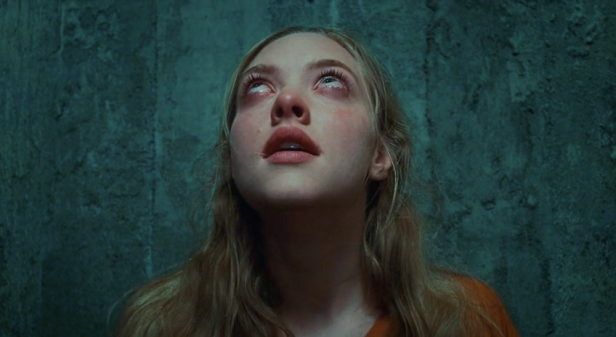
Jennifer’s Body is a film that seems to polarize audiences, whether or not they’ve actually seen the film. Much like 2017’s all-female Ghostbusters reboot, you need not have actually watched the film to have developed passionate feelings about it.
If you’ve not yet seen the film, remedy that. The trope-subverting slasher/possession film was written by Diablo Cody (Juno) and directed by Karyn Kusama (who also directed last year’s incredible The Invitation). In a nutshell, the plot revolves around a pair of small town high school girls, Needy (Amanda Seyfried) and Jennifer (Megan Fox), who have been best friends since childhood. During a night out at the local all-ages bar, Jennifer is essentially kidnapped by an indie pop-rock band who attempts to sacrifice her to the devil in exchange for fame and fortune. As this ritual calls for a virgin, and Jennifer is anything but, the ceremony goes sideways and Jennifer is given a second shot at life – as a soul-eating demon. As Jennifer begins working her way through the high school’s population of ripe young men, Needy begins to realize that something is terribly wrong. The film builds to a passionate and deadly climax as the two women find themselves facing off over both the deaths of their classmates and the tensions within their own relationship.
A lot of the pushback against the film centred on the characterization of Jennifer. As portrayed by Megan Fox, Jennifer is a young woman who is unafraid of expressing her own sexuality, both verbally and in the way that she dresses. She is unapologetically sexually active. Desires are mapped upon Jennifer’s body – both Needy’s desires and the desires of the unfortunate males in the film.

While her character in earlier scenes may be compared to the unfortunate women in earlier slasher films who are invariably punished for their similar approaches to sexuality, the feminist twist in Jennifer’s Body is that Jennifer’s sexuality ends up being a major source of power for her. Jennifer doesn’t use her sexuality to convince men to exert their own power to fulfill her desires – her sexuality is not a weapon in the sense that it manipulates men into letting her redirect their agency. It’s a weapon in that it allows her to literally eat men alive, absorbing their power to fuel her own.
The original trailer painted the film as a salacious sex romp filmed for the male gaze, omitting recognition of the deep and painfully intimate relationship between the two girls. It actually took me years to give the film a chance because of this marketing approach – I, too, believed that the film could hold nothing for me.
I was wrong. We were all wrong.

Jennifer’s Body is a love story. It is not a love story between Needy and Chip, the film’s only official couple. It is not a love story between Jennifer and any of her male victims. It is a love story between Needy and Jennifer, and this fact is glaringly obvious not only in terms of subtext, but text as well.
Needy and Jennifer are the fulcrum around which the entire film spins – the movie begins with shots of the two of them and the climax is an epic battle between them. The men are mere sidepieces to the intense (and, at times, supernatural) connection the two share. Jennifer stops herself from hurting Needy after her transformation despite her overwhelming hunger, reserving her violence instead for the teenage boys at their school.
Needy’s boyfriend, Chip, is mentioned and shown only very briefly in that opening montage, but Jennifer gets a slow-motion entrance and close-ups which lovingly showcase her gorgeous face – by cutting between Jennifer and Needy’s adoring gaze, we understand that we are sharing Needy’s perspective in this moment. Needy’s voiceover opines that people are surprised that a babe like Jennifer would ever be friends with a girl like her, and as Jennifer grins and affectionately waves at her, Needy affirms that “sandbox love never dies.” Jennifer’s is also the first image we see in the yearbook used to structure the opening montage, underscoring her incredible importance to Needy. In what amounts to a sly wink to the audience, the song that plays under this sequences is I’m Not Going to Teach Your Boyfriend How to Dance With You by the band Black Kids. The chorus contains the lyric “You are the girl, that I’ve been dreaming of / Ever since I was a little girl”.
This is no coincidence.

A fellow student actually accuses Needy and Jennifer of being lesbians at this point, which Needy refutes. But how many women have been in that same position and denied same-sex romantic feelings? I mean, this is high school, after all, and small town high school, at that. Sexuality in America is commonly fraught with danger, shame, and secrecy, due to widespread and ongoing ripples of influence stemming from conservative and repressive religiosity.
In Needy’s monologue at the opening of the film, she talks about people who write her letters praying for her and telling her to ask God for forgiveness – ostensibly, these letters are referring to the crimes which she has committed, but this scene could also be read as reminiscent of religious bigotry against same-sex desire. (Needy also reveals that she gets letters from “perverts” – while unwanted sexual attention from men is so extraordinarily common as to be arguably the norm, queer women, in particular, are often threatened with sexual violence as a means to “straighten them out”.)
Jennifer is a thorn in the side of Needy and Chip’s relationship from the very beginning. Needy is always willing to blow off her boyfriend to spend time with Jennifer – she spends more time deciding what to wear for her dates with Jennifer than her dates with Chip. The telepathic bond shared by Needy and Jennifer is commented on by Chip, as well as the fact that Needy is always ready to feed Jennifer’s co-dependency. Jennifer seems to resent Chip’s entire existence, and he resents her for “kidnapping [his] girlfriend” all the time. Jennifer’s constant needling of Chip and undermining of their relationship hints at a deep insecurity and jealousy, as well as a certain level of competition.
In a quiet but important scene at the local bar, Jennifer reaches out and grabs Needy’s hand during an emotional part of a love song. Needy, unsmiling and disdainful until this point, immediately breaks out into a beautiful, genuine grin. She glances over at Jennifer, her gaze lingering and drinking in her profile until she realizes that Jennifer is giving the lead singer the same infatuated glance – her smile fades and she disengages her hand. The close-ups of the hands and faces underscore the emotional weight in this scene. Needy is visibly disappointed by the realization that the moment is not what she had hoped it would be.

The attraction between Needy and Jennifer is alternately acknowledged and denied throughout the film, which makes sense in the context of high school in small town America. After her transformation, Jennifer weaponizes the threat of being perceived as lesbians against Needy as a way to discourage her from pressing Jennifer about what has happened to her. Needy and Chip get closer and have sex for the first time only after Jennifer’s transformation, growing hostility, and attempts to make Needy jealous. Even during this intimate encounter, Needy’s thoughts are not with Chip – they are with Jennifer. When Needy uses a box cutter to attack Jennifer, Jennifer sneeringly asks her “Do you buy all your murder weapons at Home Depot? God, you’re butch.” While both women do feel and act on their attraction to men, their primary infatuations are with each other and this dynamic drives the story of the film.
Much was made about the infamous kiss scene between Needy and Jennifer late in the film. Granted, the marketing of the film did the kiss no favours – in the hands of marketing executives, the kiss appeared to be mere queer-baiting and pandering to adolescent males. This viewpoint is exceedingly heteronormative, especially when taking into account the building of the romantic undertones to the relationship between the two women throughout the entire film. Jennifer attempts to use her sex appeal to placate Needy because she truly believes that it will work – their mutual attraction is not a secret to either of them (or to the discerning audience). And it DOES almost work. The kiss is hesitant at first as Needy tries to decide how far she is willing to take her desires – but it grows increasingly passionate as she gives in to what she has always wanted. “Needy, let me stay the night. We can play boyfriend/girlfriend like we used to,” Jennifer coaxes, making reference to past sexual experimentation.

This scene struck me as less salacious than honest; less sensational than sincere. For the two to have the relationship that is portrayed throughout the film to this point, it seems only natural for there to have been some level of physical closeness between them in the past. To paint this scene as being filmed exclusively for the male gaze is to erase and delegitimatize the queer female gaze, as well as to deny the centrality of the women’s deep and enduring bond to the entire narrative. Even if Jennifer’s motivations post-possession may be questioned, Needy’s genuine romantic love for, and attraction to, her best friend cannot plausibly be refuted. The film builds to this moment – to exclude the kiss from the story on the grounds that men may find it too stimulating would be a disservice to the queer women who are so rarely represented in film. Of course, things don’t work out happily for the two by the end of the film, but this is a horror movie.
In my opinion, Karyn Kusama and Diablo Cody created a remarkable queer-horror film that rings true to me in ways not often found in mainstream-ish films and also serves to combat bisexual erasure and highlight the complexities of sexual desire. If Kusama and Cody are ever given the funding and support to work together again, I will be the first in line to buy a ticket, no matter how the marketing portrays the finished product. If Jennifer’s Body taught me anything, it’s that you can’t judge a film about women by its trailer.


All I know is that my queer female gaze enjoyed that kiss tremendously
LikeLike
I love this analysis!
LikeLike
Apt commentary on my favorite movie of all time. I’m convinced they were in love and in denial. Been there myself. If they’d come out and said that in 2009 I think it’d have been canonized as a queer classic
LikeLike
pretty sure this just confirmed me questioning if i’m fluid
LikeLike